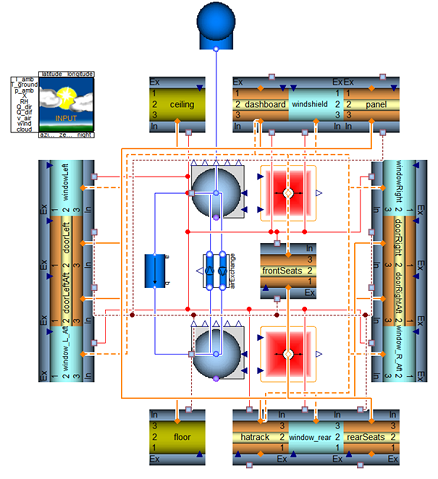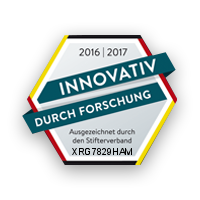Introduction to HumanComfort Library
HumanComfort models the dynamic, thermal behaviour of buildings, vehicles, ship and aircraft cabins. Additionally, the thermal comfort of persons can be determined. The product contains the modular descritption of all physical heat transfer processes (ready-to-use).
Energy systems are optimized in accordance with economic criteria. From the view of a user of an air conditioning/heating system the thermal comfort is very often of more importance. How the thermal comfort changes with personal and thermal factors was examined in several studies and put into classification numbers. Standardized calculation methods of these numbers were developed and allow a detailed analysis of the human comfort.
HumanComfort Vehicle Cabin Model

Participants
The training course is for engineers and scientists who deal with development and simulation of energy systems. Please note that the number of participants is limited to 6 attendees in order to enable an intensive support of the group.
Course instructor
The course is held in German by Boris Michaelsen. Mr. Michaelsen models energy systems in several industrial and research projects for more than 10 years. Additionally, he is the developer of HumanComfort Library and was involved in many projects using the library.
Prerequisites for attending
For a successful participation you should have a fundamental knowledge of using the simulation software Dymola as well as common functional principles of the description language Modelica. Furthermore, a personal computer with an installed Dymola software and a valid license of the HumanComfort Library is needed.
Training course objectives
The objective is to introduce the participants to the Modelica library HumanComfort.
Content
- Purpose of the library
- Package-Structure
- Explanation of basic components (e.g. volume models, wall models, weather models, comfort models, irradiation models and more)
- Construction of a zone model out of the basic components
- Studying various examples of the library (e.g. for buildings, aircrafts, naval vessels or automotive vehicles)
- Extension of user defined pressure loss and heat transfer models
- Usage of the FluidDynamics model (CFD)
- Individual studies of participant's use cases
Course duration and venue
The course will take 2 days (9 hours each including lunch break). It is either provided online or in presence. Special offers are available for onsite trainings.
Bookings
For your requests give us a call (+49-40-76629 2630) or write an email (training@xrg-simulation.de). You will receive a quotation via email and make your booking. The booking will be confirmed by email, again. Until 14 days before the course you can cancel without any charges. After that period we bill a cancellation fee about 50 pecent of the costs.
Auszeichnung


